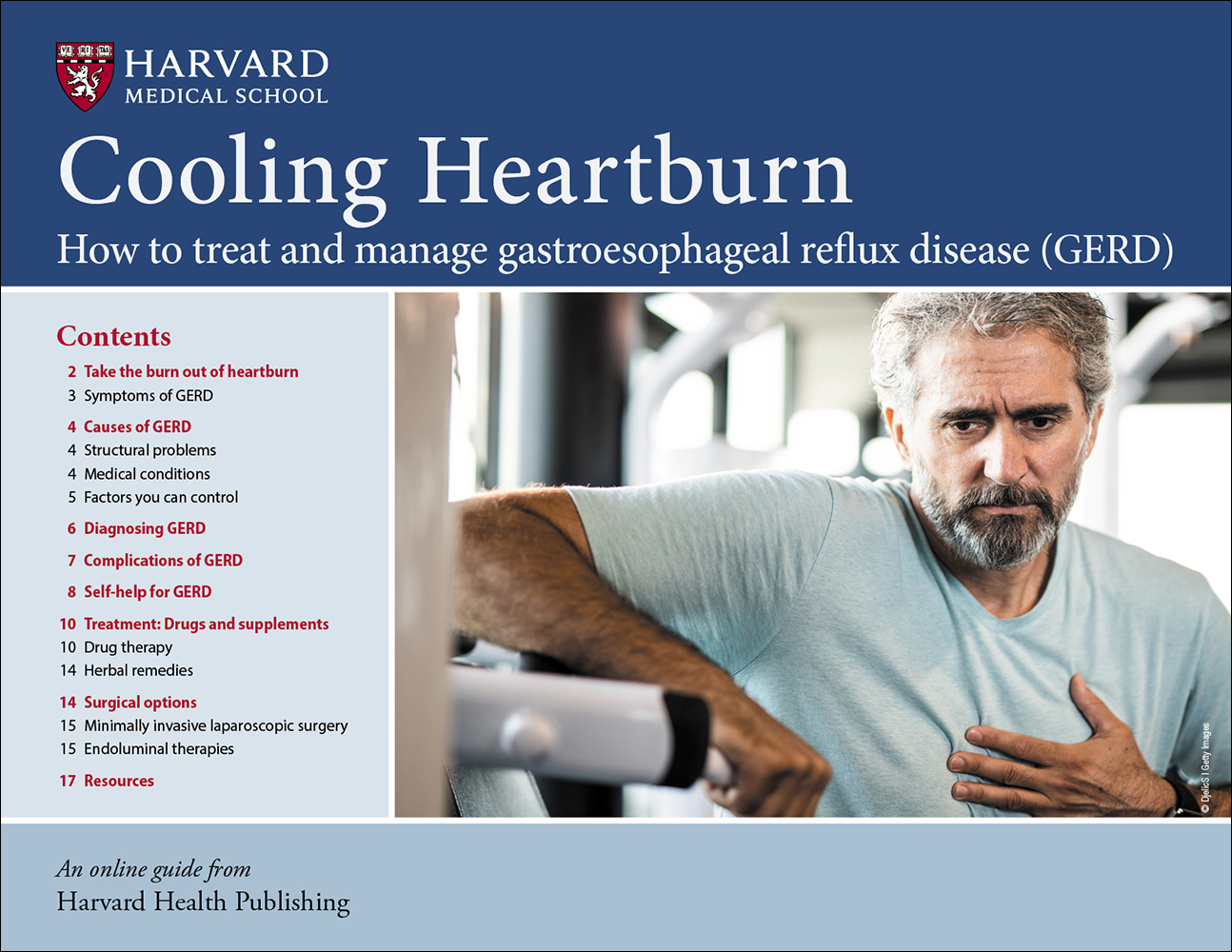Feeling the burn of acid reflux
Heartburn or GERD? Here's how to differentiate between these common digestive issues.

Even the most pleasant meal can produce an unpleasant — even painful — aftermath. Perhaps you feel a burning sensation in your chest or need to repeatedly burp or clear your throat.
Is it simply heartburn? Or something more serious, like gastroesophageal reflux disease (GERD)?
"These common digestive-related problems often get confused with each other because they share many of the same traits," says Dr. Lawrence Friedman, assistant chief of medicine at Harvard-affiliated Massachusetts General Hospital and medical editor of Harvard Health Publishing's online guide Cooling Heartburn. "While they are connected, they are quite different."
Here is an explanation of heartburn and GERD, and how to manage and treat them.
Getting to know GERD
Heartburn is a burning pain behind the breastbone. It is the most common gastrointestinal symptom, with more than 60 million Americans suffering from flare-ups at least once a month. Heartburn is triggered by certain foods and drinks, or from eating too much. It often goes away on its own after a few minutes, although it can last hours and require over-the-counter medication.
Occasional heartburn is nothing serious. However, severe and recurring heartburn is a symptom of frequent or persistent acid reflux, also known as GERD. For people with GERD, stomach acid rises from the stomach into the esophagus, much like water bubbling up into a sink from a plugged drain. When stomach acid reaches the esophagus, it can ignite heartburn.
Heartburn from GERD often extends from the bottom of the rib cage to the base of the neck and can last for hours. It may be accompanied by a stinging sensation in the throat and a sour taste in the mouth. "You should get checked for GERD if you have heartburn more than twice a week," says Dr. Friedman.
Left alone, GERD can cause complications like esophagitis (inflammation of the esophagus) and occasionally precancerous changes in the lining of the esophagus (called Barrett's esophagus). While intense heartburn is the most common symptom of GERD, there are others, including
- nausea
- difficulty swallowing
- sore throat
- regurgitation, the backflow of stomach fluids into your mouth, which may come up either forcefully as vomit or as a "wet burp"
- coughing, wheezing, or a constant need to clear your throat
- hoarseness, especially in the morning.
The most common cause of GERD is a malfunction of the lower esophageal sphincter (LES), the muscular ring that separates the esophagus from the stomach. Usually, it functions as a gate. The muscle relaxes when you swallow, which opens the passage between the esophagus and stomach and allows food to pass through.
When the sphincter tightens, it closes the route, keeping food and acidic stomach juices from flowing back up into the esophagus. However, with GERD, the LES relaxes when it shouldn't, or it weakens and remains partially open. This allows stomach acid to rise into the esophagus.
Putting out the fireDiet changes and medication can help stay ahead of heartburn and GERD. For example: Diet. Cut back on trigger foods and drinks associated with heartburn, such as mint, fatty and spicy foods, tomatoes, onions, garlic, chocolate, coffee, tea, carbonated beverages, and alcohol. Also, try eating smaller meals, sit upright for at least one hour after eating, and avoid eating two hours before bedtime. Medication. Over-the-counter antacids or acid blockers neutralize digestive acids in the stomach and esophagus and work well for mild and occasional heartburn. Your doctor may recommend an H2 blocker or a proton-pump inhibitor (PPI), and sometimes a combination of both, for persistent or severe symptoms. These drugs are in many over-the-counter products, with stronger versions available by prescription. Both H2 blockers and PPIs work by reducing stomach acid production. |
Seeking relief
Many of the self-help remedies for heartburn also help manage GERD. (See "Putting out the fire.") If these don't provide relief, you may need to consider surgery to tighten your LES.
GERD is also associated with hiatal hernia. This is an opening (hiatus) in the diaphragm, the muscle that separates the chest from the abdomen. With a hiatal hernia, part of the stomach pokes through the hole into the chest. This changes the angle at which the esophagus joins the stomach and weakens the ligaments that hold these organs in proper alignment. The changes make it harder for the LES to work properly, and reflux can result.
Almost everyone with a large hiatal hernia has GERD, and hiatal hernias are commonly found in people with GERD who also have moderate or severe esophagitis.
Hiatal hernia usually doesn't require treatment. "However, you may need surgery to repair the hernia if you have persistent reflux symptoms, you suffer from esophagitis that does not heal with medication, or the hiatal hernia is so large that part of the stomach becomes lodged above the diaphragm," says Dr. Friedman.
Image: © Lars Neumann/Getty Images
About the Author

Matthew Solan, Executive Editor, Harvard Men's Health Watch
Disclaimer:
As a service to our readers, Harvard Health Publishing provides access to our library of archived content. Please note the date of last review or update on all articles.
No content on this site, regardless of date, should ever be used as a substitute for direct medical advice from your doctor or other qualified clinician.
















